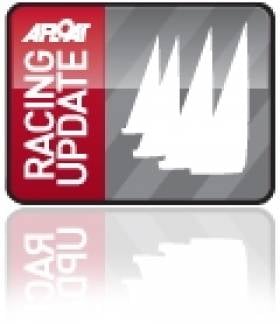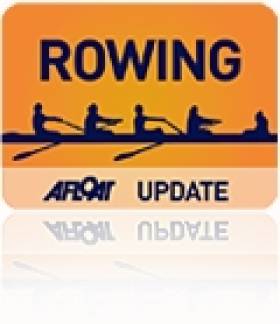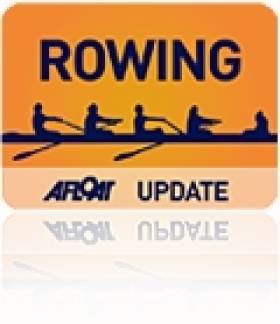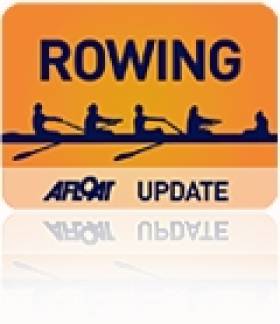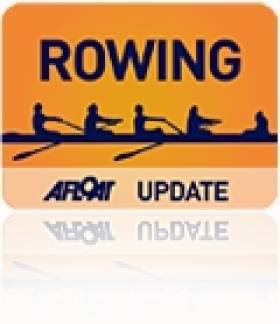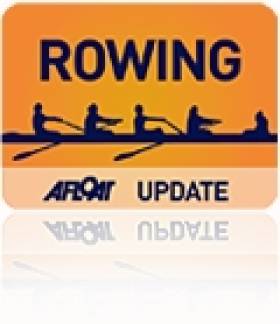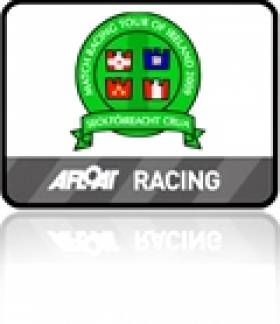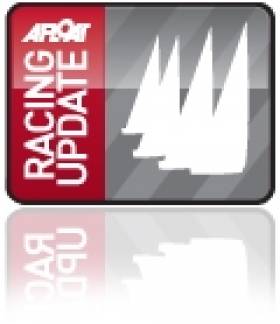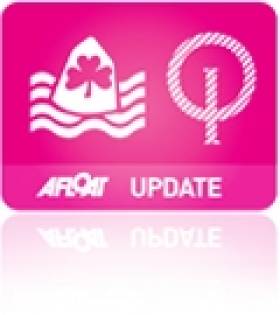Displaying items by tag: National Championships
J109 Irish Championships For Dun Laoghaire Not Kinsale
#j109 – Perhaps the fact J109s race for IRC handicap honours as part of the ICRA national championships and separately for the class national championship title may have contributed to wires getting crossed at last weekend's Sovereign's Cup and ICRA Nationals event in Kinsale.
Irish J109 fans are currently on a high with Royal Corks' Jelly Baby winning the UK National Championships and the National Yacht Club's Ruth winning offshore in the Dun Laoghaire to Dingle Race but after another good showing of the class last weekend (first and third for Js in ICRA Div one) there was confusion over the status of the Irish championship when Kinsale Yacht Club declared Joker II the winner of the J109 national championships. [See KYC press release HERE].
John Maybury's Joker II won the ICRA division one crown off Kinsale in fine style, but J109 class captain Martin Carey has been quick to point out the 2015 J109 National Championships – a season highlight – has not yet been sailed. The J109 Irish championships will be sailed next week as part of Dun Laoghaire Regatta. 'The Nationals are part of Volvo Dun Laoghaire, they always were going to be, as we get our own start,' Carey told Afloat.ie
UCD Win Big Pot at National Rowing Championships
UCD are the new Irish men’s senior eights champions. In extremely difficult conditions at the National Rowing Championships in Cork, the big crew saw off an early challenge by Queen’s University and a late charge by NUIG/Grainne Mhaol to win their first Big Pot in 38 years.
The UCD women’s senior eight completed a great day for the college when they beat Muckross in their final.
National Rowing Championships, National Rowing Centre, Cork - Day Three
Men
Eight – Senior: 1 UCD (S Craven, P Grogan, D Pierce, D Neale, F Manning, S Jacob, G Duane, T Doyle; cox: J Lynch) 5:39.5, 2 NUIG/Grainne Mhaol 5:41.8, 3 Queen’s University 5:44.2, 4 Trinity 6:08.7.
Four – Novice, coxed: 1 NUIG, 2 Cappoquin, 3 UCC.
Pair – Intermediate: 1 Queen’s University (A Little, K Duffy) 6:58.4, 2 NUIG 8:03.9, 3 Carlow 7:01.1. Junior 18A: 1 Bann 6:53.2, 2 St Joseph’s College 6:57.1, 3 Presentation College 7:06.9.
Sculling, Quadruple – Junior 18A: 1 Castleconnell 6:06.2, 2 Skibbereen 6:12.0, 3 Offaly 6:12.8. Junior 16, coxed (non-Championship): 1 Galway 6:45.4, 2 Tribesmen 6:48.0, 3 Cork 6:51.8
Double – Intermediate: 1 Carlow 6:40.5, 2 Skibbereen 6:41.0, 3 Queen’s 6:55.0.
Single – Senior: 1 Muckross (S Casey) 6:56.0, 2 Skibbereen A (P O’Donovan) 6:56.5, 3 Muckross (C Moynihan) 7:20.8, 4 Skibbereen (Murphy) 7:28.3, 5 Skibbereen (McCarthy) 7:37.0. Lee Valley (Keohane) did not start.
Women
Eight – Senior: 1 UCD (C Tanner, K Joy, C Ni Reachtagain, N Fearon, S Bennett, L Gannon, L Reid, A Gilligan; cox: E Craven) 6:29.9, 2 Muckross 6:34.1, 3 St Michael’s 6:38.6, 4 NUIG 6:40.5, 5 Queen’s 6:42.2, 6 Trinity 7:07.8.
Intermediate: 1 Queen’s University 6:33.8, 2 Trinity 6:41.1, 3 St Michael’s 6:44.2. Novice: 1 Galway 6:42.6, 2 Queen’s 6:50.2, 3 Carrick-on-Shannon 7:01.5. Junior 16 (non-Championship): 1 Galway 6:49.2, 2 Cork 6:59.6, 3 Portora 7:09.0.
Pair – Junior 18: 1 St Michael’s 7:43.9, 2 Portora 7:52.4, 3 Commercial 8:41.3.
Sculling, Quadruple – Novice: 1 Commercial 7:56.3, 2 Neptune 8:06.0, 3 Clonmel 8:11.9. Junior 18A: 1 Skibbereen 6:58.7, 2 Cork 7:05.5, 3 Neptune 7:13.5.
Single – Senior: 1 City of Derry (L D’Urso) 7:56.5, 2 Three Castles (E Moran) 8:10.9, 3 Portora (H Nixon) 8:20.4, 4 Three Castles (Quinn) 8:28.6, 5 Old Collegians (Walshe) 9:08.7. Killorglin (M Dukarska) did not finish. Intermediate: 1 City of Derry (L D’Urso), 2 Skibbereen (Walsh), 3 Shandon (Corcoran-O’Hare).
Dukarska's Spectacular Capsize Robs Her of Title
Windy conditions and choppy water played their part in three capsizes in the first session of finals at the National Rowing Championships at the National Rowing Centre in Cork. By far the most important befell Monika Dukarska, who was leading just metres short of the line in the women’s senior single sculls when she missed a stroke and fell in. Laura D’Urso capitalised to take the title.
Sean Casey took the men’s senior sculls title after a fine race down the choppy course with Paul O’Donovan. Queen’s won the women’s intermediate eight and the men’s intermediate pair – in which Trinity (before the race) and Carlow (at the end of it) both capsized.
National Rowing Championships, National Rowing Centre, Cork - Day Three
Men
Pair – Intermediate: 1 Queen’s University (A Little, K Duffy) 6:58.4, 2 NUIG 8:03.9, 3 Carlow 7:01.1.
Sculling, Quadruple – Junior 18A: 1 Castleconnell 6:06.2, 2 Skibbereen 6:12.0, 3 Offaly 6:12.8.
Single – Senior: 1 Muckross (S Casey) 6:56.0, 2 Skibbereen A (P O’Donovan) 6:56.5, 3 Muckross (C Moynihan) 7:20.8, 4 Skibbereen (Murphy) 7:28.3, 5 Skibbereen (McCarthy) 7:37.0. Lee Valley (Keohane) did not start.
Women
Eight – Intermediate: 1 Queen’s University 6:33.8, 2 Trinity 6:41.1, 3 St Michael’s 6:44.2. Novice: 1 Galway 6:42.6, 2 Queen’s 6:50.2, 3 Carrick-on-Shannon 7:01.5.
Pair – Junior 18: 1 St Michael’s 7:43.9, 2 Portora 7:52.4, 3 Commercial 8:41.3.
Sculling, Quadruple – Novice: 1 Commercial 7:56.3, 2 Neptune 8:06.0, 3 Clonmel 8:11.9.
Single – Senior: 1 City of Derry (L D’Urso) 7:56.5, 2 Three Castles (E Moran) 8:10.9, 3 Portora (H Nixon) 8:20.4, 4 Three Castles (Quinn) 8:28.6, 5 Old Collegians (Walshe) 9:08.7. Killorglin (M Dukarska) did not finish.
Skibbereen Keep the Heat On at National Rowing Championships
Skibbereen brought their titles up to five for the first two days of the National Rowing Championships in Cork by taking the women’s senior pair through Christine Fitzerald and Denise Walsh and combining with Lee Valley to win the men’s senior quadruple scull. The women’s Junior 18A eight was an emphatic win for St Michael’s, and Sarah Allen of Bann, who is just 16, was also in commanding form as she won the women’s novice single sculls championship.
The main action of the day ended with Anthony English of UCD taking the men’s intermediate single scull and Castleconnell’s Dylan Quigley and Adrian Sheahan taking the men’s junior 18A double scull.
National Rowing Championships, National Rowing Centre, Cork – Day Two
Men
Eight – Intermediate: 1 Queen’s 6:00.1, 2 Trinity 6:01.7, 3 Neptune 6:05.5.
Four, coxed – Junior 18A: 1 Bann 6:33.5, 2 St Joseph’s College 6:41.8, 3 Portora 6:47.6. Masters, coxed (non-Championship): 1 Commercial/City of Derry, 2 Fermoy, 3 Galway RC.
Pair – Senior: 1 Queen’s (E Mac Domhnaill, M Ewing) 6:56.7, 2 Grainne Mhaol 7:01.1, 3 St Michael’s 7:01.7, 4 Queen’s B 7:12.9, 5 Galway B 7:15.0, 6 Galway A 7:52.7.
Sculling, Quadruple – Senior: 1 Skibbereen/Lee Valley (G O’Donovan, G Murphy, K McCarthy, C Dowling) 6:05.1, 2 Queen’s 6:07.2, 3 University of Limerick/Garda 6:09.7.
Double – Junior: 1 Castleconnell (D Quigley, A Sheahan) 6:37.4, 2 Lee 6:44.2, 3 Commercial 6:45.7.
Single – Intermediate: 1 UCD (A English) 7:17.8, 2 Skibbereen 7:27.9, 3 Neptune 7:31.0. Junior 16 (non-Championship): 1 Cork (D Buckley) 7:38.1, 2 Offaly (Phelan) 7:38.6, 3 Cork 7:50.4.
Women
Eight – Junior 18A: 1 St Michael’s 6:49.3, 2 Cork 7:00.3, 3 Portora 7:03.6.
Pair – Senior: 1 Skibbereen (C Fitzgerald, D Walsh) 7:53.0, 2 Commercial 8:02.8, 3 St Michael’s 8:03.6.
Sculling, Quadruple – Senior: 1 Skibbereen 6:51.2, 2 Old Collegians/Three Castles 6:51.7, 3 St Michael’s 7:14.5. Junior 16 (non-Championship): 1 Galway 7:27.1, 2 Commercial 7:39.1, 3 Muckross 7:49.3.
Double – Intermediate: 1 Commercial 7:35.1, 2 Skibbereen 7:40.0, 3 Garda 8:17.0.
Single – Novice: 1 Bann (S Allen) 8:43.2, 2 Shandon (R Mertz) 8:47.9, 3 Queen’s (H Adley) 8:50.7. Junior 18A: 1 Fermoy (H Shinnick) 8:05.9, 2 Skibbereen (M Dineen) 8:10.7, 3 Portora (K Cromie) 8:19.7.
The rain came to the National Rowing Centre yesterday, but the good racing at the National Rowing Championships continued – and there was even a raging controversy as UCD’ s men’s intermediate eight was disqualified from the semi-finals after the cox turned up four minutes late for her weigh-in. UCD maintain that she should have been allowed leeway because she had reported earlier but was told to return with a registration card. In the final, Queen’s took the title, with Trinity second.
The most exciting race of the first session was in the women’s senior quadruple sculls, where Skibbereen passed a faltering Old Collegians/Three Castles crew in the closing stages and won by half a second. Bann and Commercial were more comfortable winners of the men’s junior 18 coxed fours and the women’s intermediate double sculls, but the most emphatic winner was Hilary Shinnick int the women’s junior 18A single sculls – and the Fermoy girl turned 16 in March.
National Rowing Championships, National Rowing Centre, Cork – Day Two
Men
Eight – Intermediate: 1 Queen’s 6:00.1, 2 Trinity 6:01.7, 3 Neptune 6:05.5.
Four, coxed – Junior 18A: 1 Bann 6:33.5, 2 St Joseph’s College 6:41.8, 3 Portora 6:47.6.
Pair – Senior: 1 Queen’s (E Mac Domhnaill, M Ewing) 6:56.7, 2 Grainne Mhaol 7:01.1, 3 St Michael’s 7:01.7, 4 Queen’s B 7:12.9, 5 Galway B 7:15.0, 6 Galway A 7:52.7.
Women
Sculling, Quadruple – Senior: 1 Skibbereen 6:51.2, 2 Old Collegians/Three Castles 6:51.7, 3 St Michael’s 7:14.5.
Double – Intermediate: 1 Commercial 7:35.1, 2 Skibbereen 7:40.0, 3 Garda 8:17.0.
Single – Junior 18A: 1 Fermoy (H Shinnick) 8:05.9, 2 Skibbereen (M Dineen) 8:10.7, 3 Portora (K Cromie) 8:19.7.
Skibbereen and Muckross Seniors Take Rowing Titles
Cork and Kerry took the first senior prizes on offer at the National Rowing Championships at the National Rowing Centre in Cork today. The Skibbereen senior women’s four of Orla Hayes, Christine Fitzgerald, Denise Walsh and Michelle (Shelly) Dineen had plenty to spare over Queen’s in their final, while Sean Casey and Cathal Moynihan of Muckross won the men’s senior double, also from Queen’s.
Kerryman Neil Prendeville, who rows with Castleconnell, continued the trend when he won the junior single scull from clubmate Adrian Sheehan. The women's junior double scull was won by Jenny Russell and Katie Cromie from Enniskillen club Portora.
National Rowing Championships, National Rowing Centre, Farran Wood, Cork
Day One
Men
Eight – Junior 16 (non-Championship): 1 Galway RC, 2 St Joseph’s College, 3 Cork RC.
Four, Intermediate, coxed: 1 UCD 6:26.3, 2 Queen’s 6:29.5, 3 Neptune 6:33.3
Sculling, Quadruple – Novice, coxed: 1 Shandon 6:54.5, Queen’s 6:58.3, 3 St Michael’s 7:02.1.
Double – Senior: 1 Muckross (S Casey, C Moynihan) 6:30.8, 2 Queen’s 6:31.7, 3 Lee Valley 6:36.3, 4 Skibbereen 6:41.8, 5 Galway 6:48.9.
Single – Junior 18A: 1 Castleconnell (N Prendiville) 7:21.6, 2 Castleconnell (A Sheehan), 7:24.0, 3 Neptune (Griffin) 7:29.6.
Women
Four – Senior: 1 Skibbereen (O Hayes, C Fitzgerald, D Walsh, M Dineen) 6:51.5, 2 Queen’s 6:58.5, 3 Muckross 6:58.9, 4 UCD 7:07.9, 5 Trinity 7:09.0, 6 NUIG 7:30.7. Novice, coxed: 1 NUIG 7:23.4, 2 Galway 7:24.7, 3 Queen’s A 7:38.2.
Sculling, Double – Junior 18A: 1 Portora (J Russell, K Cromie) 7:35.6, 2 Skibbereen 7:45.8, 3 Methodist College RC 7:52.6.
Day 2: Match Race Nationals, Follow it Live!
O'Regan and Flanigan Win 420 Champs
There was an abundance of sailing talent at the start line and Saturday's sailing took place in 15 to 20kts of breeze with Rob Lehane and Andrew O'Donoghue taking the overnight lead from Richie Harrington and Robbie English with Emma Geary and Niamh Connolly third in a fleet of sixteen boats.
Day two was back to Cuskinny with light north westerlies and saw Jane Butler and Jenny Andreason taking the first race. Emma and Niamh won the fifth race and Cian O'Regan (KYC) and Scott Flanigan (Howth YC) took the final race thus winning the National Title. Rob Lehane was second with Emma and Niamh taking third position and First Girls Boat.
420 National Championships 2010
1 53156 Cian O'Regan M Scott Flanigan M 13 2 4 9 4 2 1
Royal Cork's Peter McCann Takes Early Lead at Oppy Nationals
The 3 sponsored Irish Optimist Nationals got underway today in Dunmore East in County Waterford. A total of 234 boats raced two races in light to moderate North West breezes, remaining steady for the day. Provisional results after 2 races:
Senior: 1st Peter McCann, RCYC, 2nd Aran Hollowell, UK.
Junior: 1st Daire Cournane, RCYC/KYC; 2nd Fergus Flood, HYC.
Regatta: 1st Michael O'Suilleabhain, KYC, 2nd Amy Carroll.
Photos below by Noel Browne
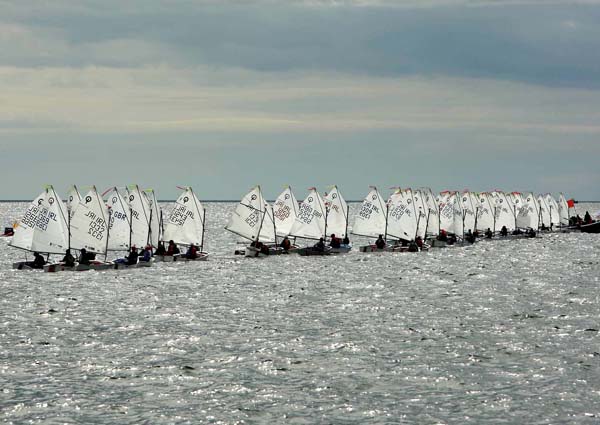
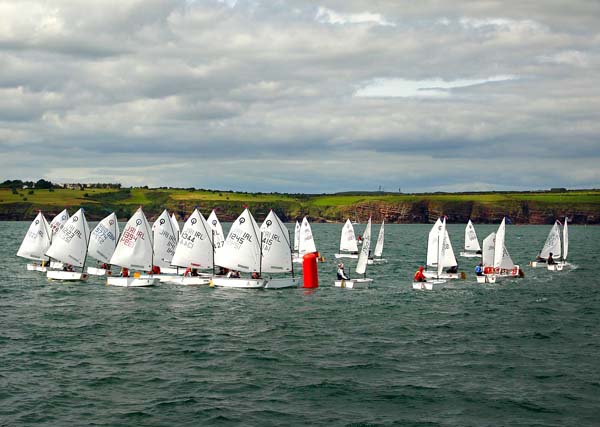
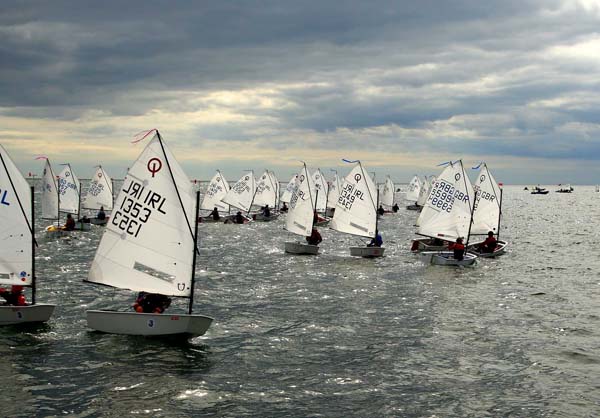
More on the forum HERE


























